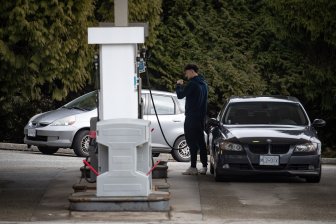Members of the LGBTQ2 community will be disproportionately impacted should the United States Supreme Court overturn Roe v. Wade, experts say.
“Abortion care is part of wrap-around sexual health education and care that is essential to the well-being of LGBTQ2S+ people, whether they become pregnant or not,” Dr. Shannon Dea, dean of the faculty of arts at the University of Regina told Global News. “Limit that care and you imperil their well-being.”
Read more:
Roe v. Wade decision could put same-sex marriage, other rights at risk, experts say
A leaked initial majority draft opinion, first reported Monday by Politico, suggests the court has voted to overturn the decision that legalized abortion nationwide — and it has since caused public outcry.
Aside from abortion, conservative Justice Samuel Alito, who authored the draft, also criticized notable American civil rights cases including Obergefell v. Hodges, which legalized marriage equality.
“None of these rights has any claim to being deeply rooted in history,” he said.
Julia Koscelnik writes on the stomach of Juliana McCallum as pro-choice demonstrators gather in front of the Supreme Court of the United States on Tuesday, May 3, 2022 in Washington, DC. In a leaked initial draft majority opinion – obtained and published by Politico, and authenticated by Supreme Court Chief Justice John Roberts – Supreme Court Justice Samuel Alito wrote that the cases Roe v. Wade and Planned Parenthood of Southeastern Pennsylvania v. Casey should be overturned, which would end federal protection of abortion rights across the country.
(Kent Nishimura / Los Angeles Times via Getty Images)
Alito’s opinion resembles his dissent in the court’s same-sex marriage ruling in which he said the 14th Amendment’s due process promise protects only rights deeply rooted in America’s history and tradition.
“And it is beyond dispute that the right to same-sex marriage is not among those rights,” Alito wrote in his 2015 dissent.
The draft is “unconscionable,” according to Ontario NDP candidate Jill Andrew, the first openly queer and Black person elected in any legislature across Canada.
“LGBTQ2S+ community members have rightfully sounded the alarm as to what this could mean for other hard-fought victories such as the right to gay marriage and same-sex partner intimacy,” she told Global News.
When Erin Reed, an American legislative and policy researcher who also identifies as a member of the LGBTQ2 community, saw the draft, she said she felt her heart drop.
“My immediate reaction was one of fear,” she told Global News from Maryland. “There are common threads around who gets affected the most.”

Erin Reed.
Supplied photo
According to a 2019 study from the Jacobs Institute of Women’s Health, sexual minority groups are generally more likely than heterosexual peers to have an abortion.
A 2017 study from the same institute also found that sexual minority women are more likely to have unintended pregnancies compared to heterosexual women.
And as some states across the U.S. have already been pushing to ban abortion, many have also introduced bills that have been openly criticized as an attack on the LGBTQ2 population.
“For instance, in Idaho, there was an anti-transgender bill that passed their house. It did not pass the Senate, thank God, but it was going to criminalize leaving the state to access transgender health care for minors. Likewise, that same week, we saw a Missouri bill that came out that was going to criminalize leaving the state for an abortion,” Reed said.
“It’s very easy for people that are in the transgender, gender non-conforming and LGBTQ2S+ community to see how these attacks intersect.”
Demonstrators hold signs during a rally in support of abortion rights on May 3, 2022 in Seattle, Washington. A leaked draft opinion by Justice Samuel Alito has suggested that the U.S. Supreme Court is poised to overturn Roe v. Wade, a historic ruling that gives women in America the ability to legally have abortions.
(Photo by David Ryder/Getty Images)
According to a 2020 estimate from the Guttmacher Institute, up to 530 transgender and non-binary people received an abortion in America in 2017.
Many of Reeds’ transgender friends have considered uprooting their lives to Canada because of the impact anti-Trans and anti-abortion legislation will have.
One friend will move from Florida to Canada next month, Reed said.
“The Roe v. Wade decision was the final straw that broke the camel’s back for her.”
Canada must do whatever it can to provide safe access to abortions for the LGBTQ2 community and “help facilitate the resettlement of what seems to be a growing number of both Trans refugees and now abortion refugees,” according to Reed.
Abortion is legal at all stages of pregnancy in Canada, where there are no laws regulating or restricting care. But legal and accessible are two very different issues when it comes to abortion in Canada, and pregnant people are regularly referred to the U.S. for more complex abortions they cannot get here.
Read more:
Canada will ensure border officials know Americans can travel for abortion: Mendicino
Most of the hands-on power to improve abortion access in Canada lies with provinces through their authority on providing health care to their residents and ensuring their doctors are properly trained to provide that health care.
Ontario, the nation’s most populated province, has the most abortion clinics in the country for a total of 23, according to the Abortion Rights Coalition of Canada.
Quebec has 12, Alberta and Manitoba have three, British Columbia has eight, New Brunswick and Saskatchewan have five and the other provinces and territories have four or less abortion clinics.
Forty-two-year-old Aditi Loveridge, founder and CEO of the Pregnancy and Infant Loss Support Centre, provides support to Canadian LGBTQ2 community members who have experienced abortion through her registered charity based out of Calgary.
“If you look at what’s happening across the border with Trans youth and affirming health care there’s just a lot of things that make me worry for the LGBTQ community, particularly regarding health care and access to it,” Loveridge, who identifies as queer, told Global News.
“It’s really, really scary. Whenever we have marginalized community members, they are at risk of having negative experiences within the healthcare system no matter what and so that is absolutely true for the LGBTQ2S+ community,” she said.
Anti-abortion rights demonstrators protest in front of the U.S. Supreme Court Building on May 03, 2022 in Washington, DC. In a leaked initial draft majority opinion obtained by Politico and authenticated by Chief Justice John Roberts, Supreme Court Justice Samuel Alito wrote that the cases Roe v. Wade and Planned Parenthood of Southeastern Pennsylvania v. Casey should be overturned, which would end federal protection of abortion rights across the country.
(Photo by Anna Moneymaker/Getty Images)
For Loveridge, being a woman of colour also impacted her own abortion experience after an ectopic pregnancy in 2011.
When sent for examination after feeling pain and spotting, she was met with a dismissive doctor.
“They spoke in a contrived East Indian accent, did an unwarranted breast exam, accused me of being hypersexual, didn’t believe my dates of conception — and then sent me home.”
A week later, she almost lost her life.
“The systemic racism I experienced in my pregnancy is directly related to why I almost died. Had I been believed, I would have had not gone to the amount of trauma that I experienced afterwards,” she said.
Founding the charity has given Loveridge the strength to tell her story and create safe spaces for marginalized communities who have experienced similarities.
“There is not a lot of racialized or LGBTQ2S+ people that are included in these conversations,” she said. “All parenting loss spaces are very centered around white, cisgender, heteronormative couples and so I think it’s so important that we start to broaden our lens a little bit.”
In last year’s federal budget, the government promised $45 million to community-based organizations making sexual and reproductive information more accessible, including groups that help people who have to travel in order to get abortion care.
A protester throws her hands reading my body, my choice into the air during a protest at the Massachusetts State House in Boston, MA on May 03, 2022. Pro-choice activists held the protest in light of the leaked draft decision by the Supreme Court and obtained by Politico that suggested the justices are poised to overturn Roe v. Wade, the landmark 1973 case that legalized abortion nationwide.
(Photo by Jessica Rinaldi/The Boston Globe via Getty Images)
A spokesperson for Health Minister Jean-Yves Duclos said on Wednesday the promised $45 million will be rolled out over three years, and $15.5 million of that is being given so far through nine contribution agreements.
“Of the nine projects, two address access to abortion, five address 2SLGBTQI communities, two address youth. Two of the nine projects include components focusing on Indigenous peoples,” said Marie-France Proulx, press secretary for Duclos, in an email. “In addition, per capita funding of $9.7M will be provided to the Province of Québec to support community-based organizations located in Québec.”
Canada’s queer and Trans community members can find information about the abortion process, resources and affirmation by accessing brochures created by the Abortion Rights Coalition of Canada here:
Canada-Wide Queer Brochure (arcc-cdac.ca)-
— with files from Global News’ Amanda Connolly and Reuters
© 2022 Global News, a division of Corus Entertainment Inc.
Stay connected with us on social media platform for instant update click here to join our Twitter, & Facebook
We are now on Telegram. Click here to join our channel (@TechiUpdate) and stay updated with the latest Technology headlines.
For all the latest Health & Fitness News Click Here



